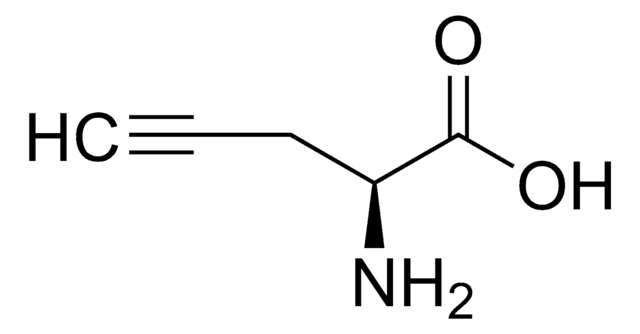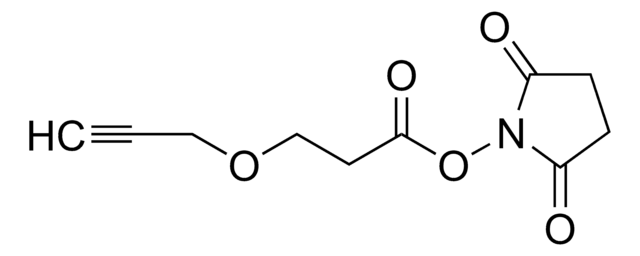900893
L-Homopropargylglycine hydrochloride
Synonym(s):
HPG
Sign Into View Organizational & Contract Pricing
All Photos(2)
About This Item
Empirical Formula (Hill Notation):
C6H9NO2 · HCl
CAS Number:
Molecular Weight:
163.60
UNSPSC Code:
12352209
NACRES:
NA.22
Recommended Products
form
powder or crystals
availability
available only in USA
mp
162 °C
storage temp.
−20°C
SMILES string
O=C(O[H])[C@@](C([H])([H])C([H])([H])C#C[H])([H])N([H])[H].Cl[H]
InChI
1S/C6H9NO2/c1-2-3-4-5(7)6(8)9/h1,5H,3-4,7H2,(H,8,9)
InChI key
SCGJGNWMYSYORS-UHFFFAOYSA-N
Application
L-Homopropargylglycine (HPG) is an amino acid analog of methionine that contains a very small modification, specifically an alkyne moiety. This compound can be fed to cultured cells and incorporated into proteins during active protein synthesis. Detection utilizes the chemoselective ligation or “click” reaction between an azide and an alkyne or cyclooctyne. For example the alkyne-modified protein can be detected with either fluorescent azide or biotin azide. Detection sensitivity with these reagents in 1-D gels and Western blots is in the low femtomole range and compatible with downstream LC-MS/MS and MALDI-MS analysis.
Signal Word
Danger
Hazard Statements
Precautionary Statements
Hazard Classifications
Self-react. C
Storage Class Code
5.2 - Organic peroxides and self-reacting hazardous materials
WGK
WGK 3
Flash Point(F)
Not applicable
Flash Point(C)
Not applicable
Choose from one of the most recent versions:
Already Own This Product?
Find documentation for the products that you have recently purchased in the Document Library.
Customers Also Viewed
Cell-free production of Gaussia princeps luciferase?antibody fragment bioconjugates for ex vivo detection of tumor cells.
Patel K G, et al.
Biochemical and Biophysical Research Communications, 390(3), 971-976 (2009)
Cleavable biotin probes for labeling of biomolecules via azide? alkyne cycloaddition.
Szychowski J, et al.
Journal of the American Chemical Society, 132(51), 18351-18360 (2010)
Live-cell imaging of alkyne-tagged small biomolecules by stimulated Raman scattering.
Wei L, et al.
Nature Methods, 11(4), 410-410 (2014)
Sirtuin 7 plays a role in ribosome biogenesis and protein synthesis
Tsai Y C, et al.
Molecular and Cellular Proteomics, 13(1), 73-83 (2014)
Using Click-Chemistry for Visualizing in Situ Changes of Translational Activity in Planktonic Marine Bacteria.
Leizeaga A, et al.
Frontiers in Microbiology, 8 (2017)
Our team of scientists has experience in all areas of research including Life Science, Material Science, Chemical Synthesis, Chromatography, Analytical and many others.
Contact Technical Service










